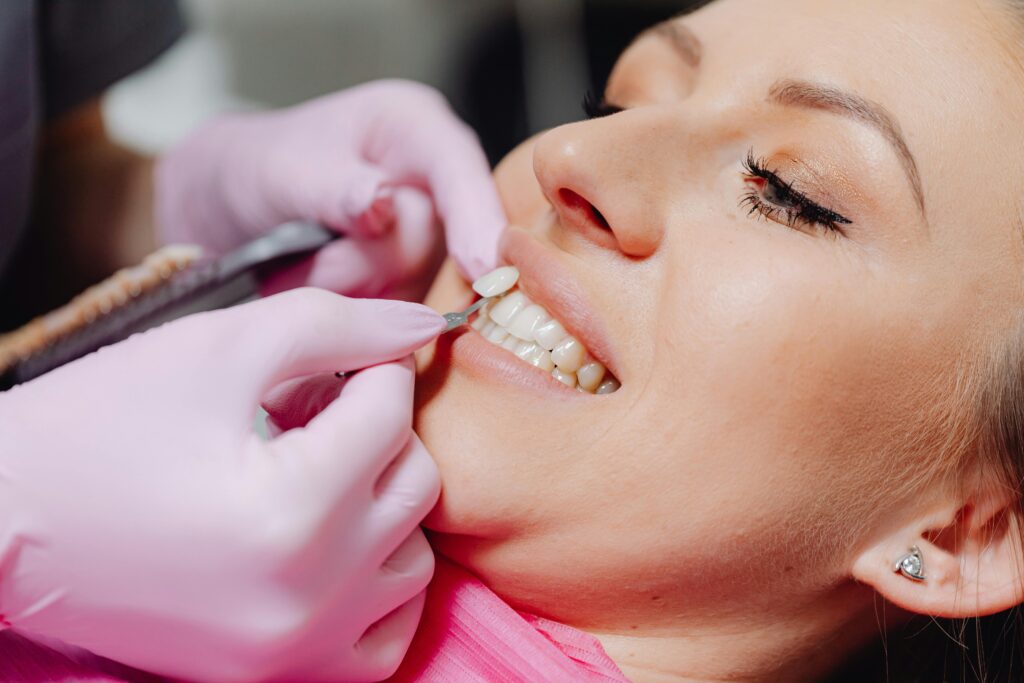Dental Crowns vs Veneers
You might be wondering what the difference is between dental crowns and veneers. Both of these techniques are methods to correct damaged or discoloured teeth, but they have key differences that you should be aware of before making a decision. This blog aims to provide a comprehensive summary of dental crowns vs veneers, explaining their indications, differences, and pros and cons. This will hopefully allow you to make an informed choice about which dental restoration method is right for you!

Dental Crowns vs Veneers: The Procedures
A dental crown is a porcelain or metal cap that covers a damaged, decayed, or weakened tooth. This is usually used to help restore a damaged tooth’s shape, strength, and appearance. Your dentist will first remove a portion of the tooth, ensuring the crown fits properly. Once the crown is ready, it is cemented over the remaining part of the tooth, providing protection and support. The entire process usually takes two visits over a few weeks. Often crowns are placed on top of dental implants which you can read more about through this blog.
Alternatively a veneer is a thin layer of material (usually porcelain or composite resin) that is applied to the front of the tooth to restore localised or generalised defects or issues with colour. During this process the dentist will usually remove or shave a thin layer of your tooth off first (the enamel), before attaching the prosthetic veneer to the front. They can usually be placed in a matter of weeks. Veneers have a variety of indications including misalignment, discoloration, ageing etc.
Dental Crowns vs Veneers: similarities?
Dental crowns and veneers are similar in that they help restore damaged, decayed or broken. They both therefore improve the appearance of your smile, and to varying degrees will restore function. It is very unlikely that other people would be able to tell the difference between a crown vs a veneer once they are fully restored.
Procedure | Pros | Cons |
Dental Crown |
|
|
Veneers |
|
|
Risks of Crowns vs Veneers
Long term outcomes
Assessing the long term outcomes of dental crowns vs implants may be an important thing to consider when choosing your treatment plan.
Dental Crowns
Crowns can last a long time with proper care, with a 10 year survival of >97%
Veneers:
Veneers also have a strong 10 year survival rate of approximately >90%
However, with both of these treatments there are risks of complications such as debonding, fracture or occurrence of secondary caries.
Functional differences
Dental crowns are used to restore both function and appearance, making them suitable for teeth that have been significantly damaged or weakened. They offer full coverage and restore chewing and biting strength.
Veneers are mainly used for aesthetic improvements, with less impact on function. While they can address some minor misalignment or wear, they do not offer the same strength and restorative function as crowns.
Dental Crowns vs Veneers: Price comparison
The big question… how do crowns and veneers compare in terms of price? Typically, dental crowns are more expensive than veneers.
Prices for both crowns and veneers vary depending on materials and location.
Dental Crowns: Typically cost between £500-£1,500 per tooth in the UK. Prices may vary based on material and complexity of the procedure.
Veneers: Generally cost between £500-£1,000 per tooth in the UK. Composite veneers are usually more affordable than porcelain veneers.
Here are my top tips for dental crowns and veneers
Dental Crowns:
Ideal for severely damaged or weakened teeth, offering strength and longevity.
Ensure the tooth has enough structure to support a crown.
Choose a dentist experienced in restorative procedures.
Practise good oral hygiene to prolong the life of the crown.
Veneers:
Best for cosmetic improvements without significant dental surgery.
Protect veneers by avoiding biting hard objects and wearing a mouthguard if you grind your teeth.
Regular dental check-ups are important for maintaining the longevity of veneers.
At The Harley Street Implant Centre we offer a full-stack dental service that includes crowns, veneers and other specialist dentistry such as dental implants. If you’re interested in finding out more, please contact us via the form below or reach out by phone or email. We hope this blog has helped you make an informed decision about your ongoing dental care.